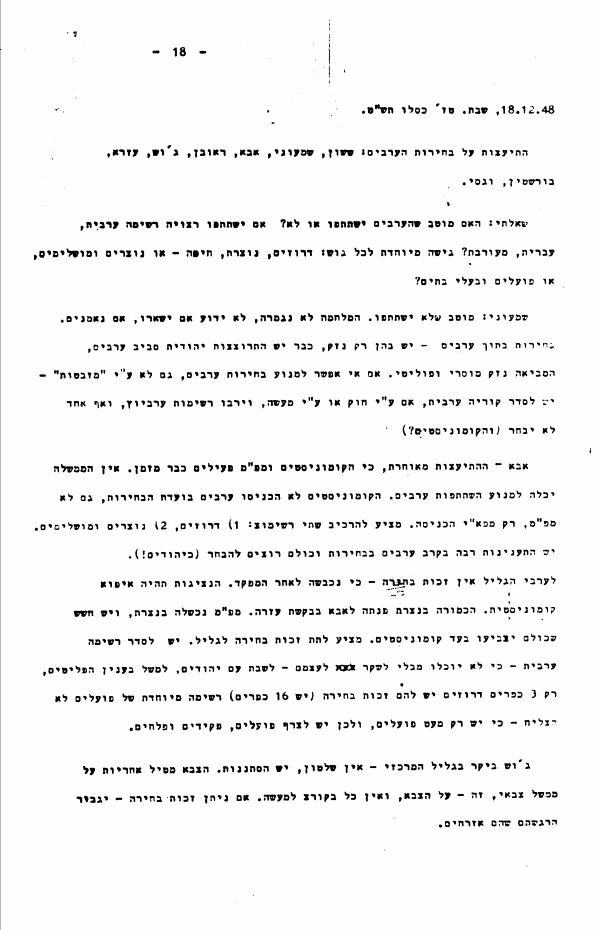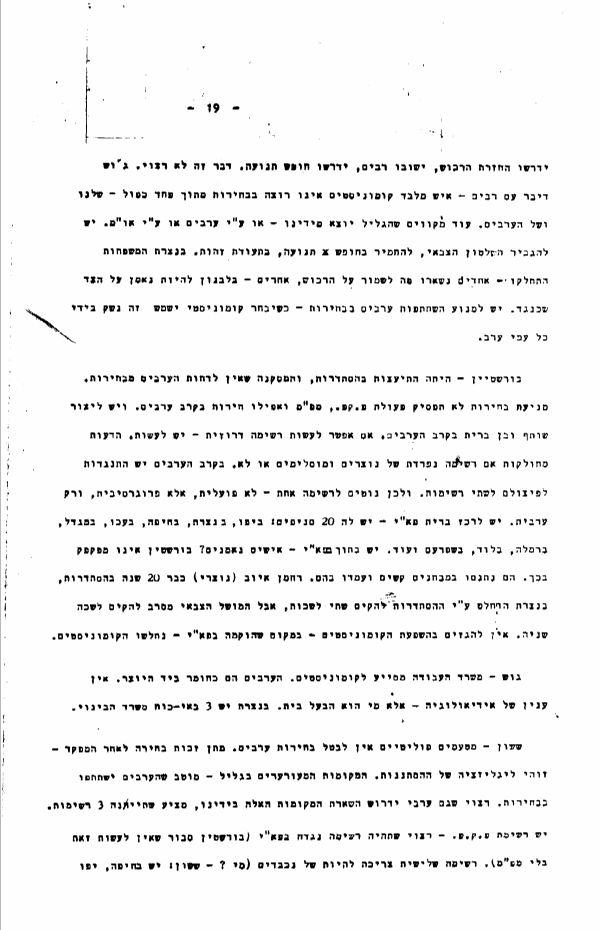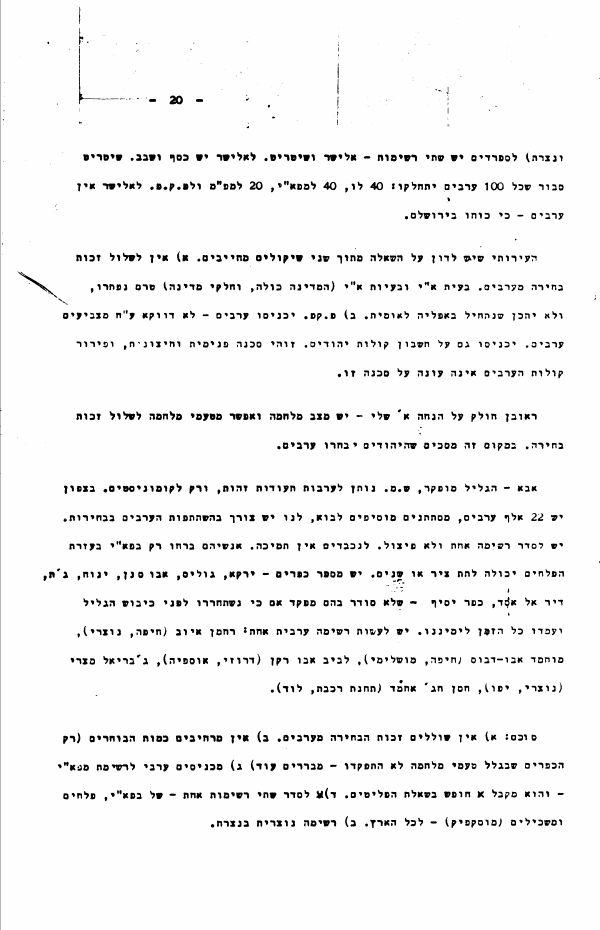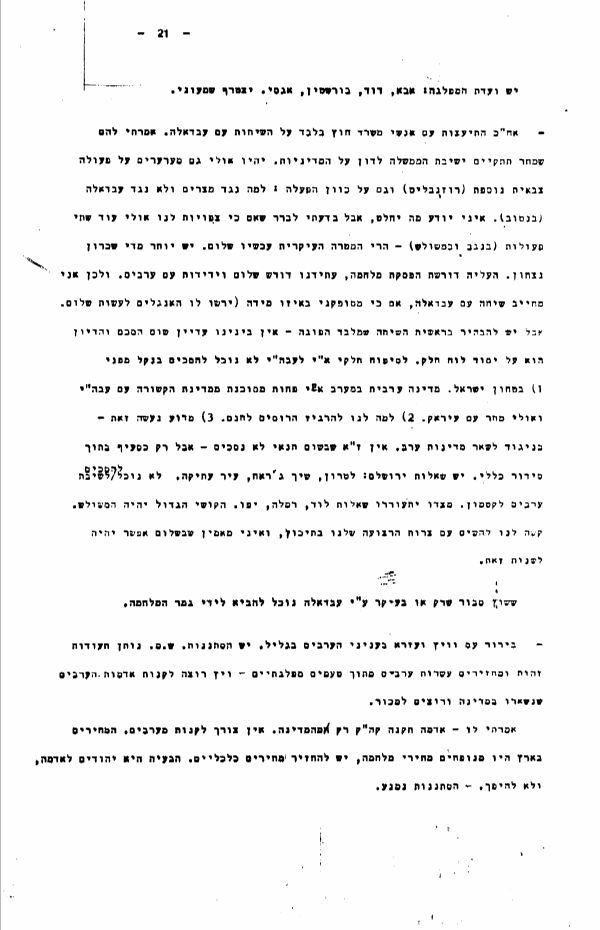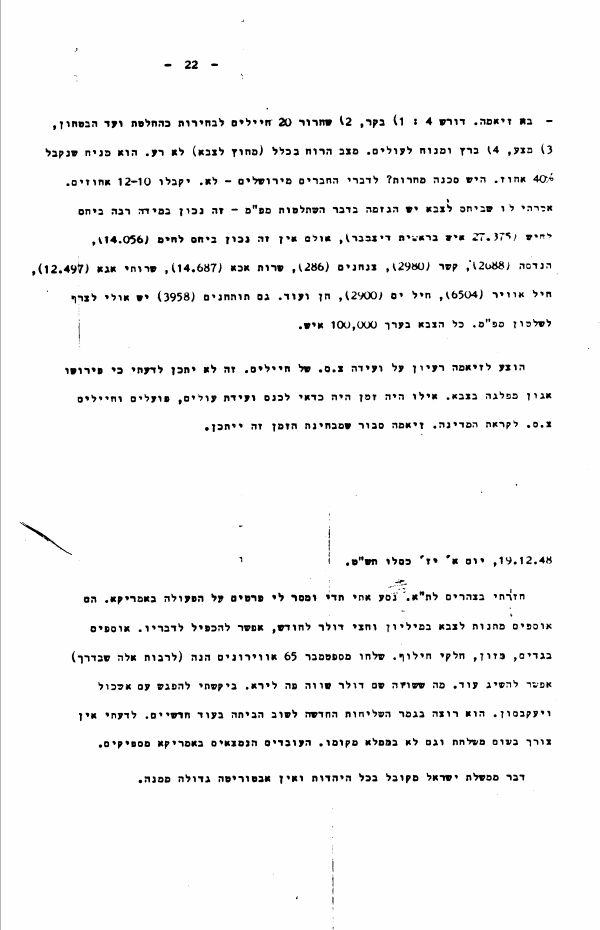1
of
Places:
Haifa
Nazareth
Jaffa
Lod
Migdal
Acre
Ramla
Shfar'am (Shafa-'Amr)
Kafr Yasif
Egypt
Jerusalem
Tverya
Bareket
Asad
Julis
Jatt
The use of the photograph is subject to the Copyright Law, 2007
18.12.1948
223447
Saturday, December 18, 1948 [Tiberias] I consulted on voting by Arabs: [Eliahu] Sasson, [Ya’akov] Shimoni, Abba [Khoushy], Reuven [Shiloah], Josh [Palmon], Ezra [Danin], Borstein [Reuven Bareket], [Eliyahu] Agassi. I asked: Is it better that the Arabs participate or not? If they participate, should there be an Arab, Jewish, [or] mixed election ticket? A distinct approach for each bloc: Druze, Christians, Haifa – either Christians and Muslims, or workers and homeowners? [Ya’akov] Shimoni: It’s better that they don’t participate. The war isn’t over, it’s not clear whether they’ll stay, whether they’re loyal. Elections among the Arabs – would only cause harm. There are already Jews scrambling around Arabs [for Arab votes?], which causes moral and political harm. If Arab voting cannot be prevented, not even by “mazbatot” [petitions] – then an Arab quria [a voting district based on ethnicity/community] should be organized, whether by law or in practice, and then there would be many Arab election tickets, and no one would be elected (and the Communists?). Abba [Khoushy] – This consultation is too late, because the Communists and Mapam have long been active. The government cannot prevent Arab participation. The Communists didn’t include Arabs in their election committee, neither did Mapam, only Mapai did. He proposes forming two election tickets: 1) Druze, 2) Christians and Muslims. There’s a lot of interest among the Arabs in the elections and everyone wants to be elected (like the Jews! [– Ben-Gurion]). The Galilee Arabs have no voting rights – because they were conquered after the census. The representation will therefore be Communist. The clergy in Nazareth approached Abba [Khoushy] to request help. Mapam failed in Nazareth, and there’s concern that everyone will vote for the Communists. He proposes granting voting rights to the Galilee. It’s necessary to arrange an Arab election ticket because – without lying to themselves – they won’t be able to align with Jews, for example on the refugee issue. Only 3 Druze villages have voting rights (there are 16 villages). A special election ticket of workers won’t succeed – because there are only a few workers – and therefore workers, bureaucrats, and fellahin [Arab peasants] would have to be combined. Josh [Palmon]: He visited the Central Galilee – there’s no governance; there are infiltrations. The army places responsibility on the military government, the latter – on the army, and in practice there’s no oversight. If we grant voting rights – it will increase the sense that they’re citizens, they’ll demand the return of property, many will return, will demand freedom of movement. This is not desirable. Josh spoke with many people – no one but the Communists wants there to be voting, out of a twofold fear – [fear of] us and [fear of] the Arabs. They still hope that the Galilee will be taken out of our hands – either by the Arabs or by the UN. It’s necessary to strengthen military rule, to be stricter regarding freedom of movement, ID cards. In Nazareth families were divided – some stayed here to protect the property, others [are] in Lebanon, so as to remain loyal to the opposing side. It’s necessary to prevent Arab participation in the elections – when a Communist is elected, it will serve as a weapon in the hands of all the Arab nations. Borstein [Reuven Bareket] – there was a consultation in the Histadrut, and the conclusion was that the Arabs should not be prevented from voting. Prevention of voting won’t halt the activity of the PCP [Palestine Communist Party], Mapam, or even Herut among the Arabs. And it’s necessary to form a partner and ally among the Arabs. If it’s possible to form a Druze election ticket – then this should be done. Opinions are divided as to a separate ticket of Christians and Muslims or not. Among the Arabs there’s opposition to their division into two tickets. And therefore they’re inclined towards one ticket – not laborite, but progressive, and only Arab. Brit PEI [BPEI, the Workers of Eretz Israel Alliance, a Jewish-Arab body within the Histadrut (labor federation)] should be centralized – it has 20 branches: in Jaffa, Nazareth, Haifa, Acre, Majdal, Ramle, Lod, Shfar’am, and elsewhere. Are there loyal people in BPEI? Borstein doesn’t doubt this. They were put to difficult tests and came through. Rahman Ayyub (a Christian) has been in the Histadrut 20 years. In Nazareth the Histadrut decided to establish two bureaus, but the military governor refuses to establish a second Bureau. The Communist influence should not be overstated. Wherever BPEI was established – the Communists were weakened. Josh [Palmon] – the Ministry of Labor is assisting the Communists. The Arabs are like clay in the hands of a sculptor. It’s not a matter of ideology – but of who is the landlord. In Nazareth there are 3 representatives of the Ministry of Housing. [Eliahu] Sasson – for political reasons, Arab voting should not be canceled. Granting voting rights to [those who returned] after the census – this legalizes infiltration. [In] the unstable places in the Galilee – it’s better that the Arabs participate in elections. It’s desirable that the Arabs too demand that these places remain in our hands. He proposes that there be 3 tickets. One PCP ticket – it would be good to have an opposing BPEI ticket (Borstein thinks this should not be done without Mapam). A third ticket should be dignitaries (who? – Sasson: there are [some] in Haifa, Jaffa, and Nazareth). The Sephardim have two tickets – [Eliyahu] Elyashar and [Bechor] Sheetrit. Elyashar has money and shabab [young people]. Sheetrit thinks that every 100 Arabs will be distributed [as follows]: 40 to him, 40 to Mapai, 20 to Mapam and PCP. There are no Arabs for Elyashar – because his strength lies in Jerusalem. I commented that the question should be discussed in terms of two compulsory considerations: A) Voting rights should not be denied to the Arabs. The Eretz-Israel problem and the problems of Eretz Israel (the state as a whole, and parts of the state) have not yet been resolved, and it’s inconceivable that we should have discrimination based on nationality from the outset. B) The PCP will place Arabs [in the Knesset] – not necessarily on the basis of Arab voters. They’ll also place them on the basis of Jewish voters. This is an internal and external danger, and disabling Arab votes doesn’t address this danger. Reuven [Shiloah] disputes my assumption A – there’s a state of war, and for reasons of war voting rights can be denied. Instead he agrees to have Jews elect Arabs. Abba [Khoushy] – the Galilee is out of control; I.S. [the intelligence service] issues ID cards to Arabs, and only to Communists. In the north there are 22,000 Arabs; infiltrators are continuing to arrive. We need to have Arabs participate in the elections. There should be one ticket, rather than division. The dignitaries have no support. Their people fled; only BPEI, with the help of the fellahin, can produce one or two delegates. There are a number of villages – Yarka, Julis, Abu Snan, Yanuh, Jatt, Deir al-Asad, Kafr Yasif – where a census wasn’t organized, even though they were liberated before the conquest of the Galilee and always stood by our side. There should be one Arab ticket: Rahman Ayyub (Haifa, Christian), Muhammad Abu Dabous (Haifa, Muslim), Labib Abu Rokan (Druze, ‘Usfiya), Jibril Masri [sp.] (Christian, Jaffa), Hassan Haj Ahmad (railway station, Lod). It was agreed: A) The Arabs will not be denied voting rights. B) The number of voters will not be expanded (just those villages that for reasons of the war were not counted in the census – to be further clarified). C) An Arab will be added to the Mapai ticket – and gets freedom [to vote as he chooses] on the refugee question. D) There will be two tickets: One – of BPEI, fellahin, and educated (muthaqafin [intelligentsia]) – for the entire country. E) A Christian ticket in Nazareth. There is a party committee [regarding Arabs]: Abba [Khoushy], David [Hacohen], [Reuven] Borstein, [Eliyahu] Agassi. Shimoni will join. – Afterwards I consulted with the Foreign Ministry people separately [from those named above] regarding the talks with Abdallah. I told them that tomorrow there would be a government meeting to discuss the policy. There might also be objections to another military action (Rosenblüth [Pinchas Rosen]), as well as the nature of the action: why against Egypt, and not against Abdallah ([Mordechai] Bentov). I don’t know what will be decided, but I intend to clarify, because even though we anticipate possibly two more actions (in the Negev and in the Triangle), the main goal now – is peace. There’s too much of being drunk with victory. ‘Aliya requires a halt to the war, [and] our future requires peace and friendship with Arabs. And therefore I insist on a conversation with Abdallah, although I have doubts as to how much the English will allow him to make peace. But it should be clarified at the start of the conversation that aside from a truce – there is no agreement between us yet, and the discussion is based on a blank slate. We cannot easily agree to parts of Eretz Israel being annexed to Transjordan, because of 1) Israel’s security; an Arab state in Western Eretz Israel is less dangerous than a state linked with Transjordan, and tomorrow possibly with Iraq. 2) Why would we aggravate the Russians for nothing. 3) Why would we do this – in contrast to the other Arab states. This does not mean that we would not agree under any circumstances – but only as a clause within a general arrangement. There are questions regarding Jerusalem: Latrun, Sheikh Jarrah, the Old City. We cannot agree to the return of Arabs to Katamon. For his part there will arise questions regarding Lod, Ramle, Jaffa. The major difficulty will be the Triangle. It’s hard for us to accept the narrowness of our strip in the Tichon [in the Sharon Plain], and I do not believe that under terms of peace it will be possible to change this. Sasson believes that only, or primarily, through Abdallah will we be able to bring about the end of the war. – Consultation with Yosef [Weitz] and Ezra [Danin] regarding the Arabs in the Galilee. There’s infiltration. I.S. [the intelligence service] is issuing ID cards, and bringing back dozens of Arabs for political-party reasons. Weitz wants to buy the lands of Arabs who remained in the state and want to sell. I told him – land will only be brought by KKL [the Jewish National Fund, JNF] from the state. There’s no need to buy from Arabs. The prices in the country were overblown, wartime prices. It’s necessary to get back to market prices. The problem is Jews for lands, and not the reverse. We’ll prevent infiltration. Ziama [Aran] came. He’s demanding 4 [things]: 1) [Aharon] Becker, 2) the release of 20 soldiers for elections as decided by the Defense Committee, 3) [an election] platform, 4) [Yosef] Baratz and [Yehoshua] Manoah for immigrants. The overall mood (aside from the army) is not bad. He estimates that we’ll receive 40%. Does Herut pose a threat? – According to the [Mapai] members from Jerusalem – no. They’ll receive 10-20%. I told him that with respect to the army, Mapam’s domination is overstated – it’s true to a large extent with respect to Hayish (27,375 men at the start of December), but it’s not true with respect to garrison (14,056), engineering (2,688), signal (2,980) paratroopers (286), Personnel Department services (14,687), Logistics Department services (12,497), Air Force (6,504), Navy (2,900), WC [Women’s Corps], etc. Maybe artillery [corps] (3,958) should also be added to Mapam leadership. [In] the entire army [there are] about 100,000 men. The idea of a S.Z. [Socialist-Zionist] conference of soldiers was posed to Ziama. This is not possible, in my opinion, because it means political-party organizing within the army. If there were time, it would be worth convening a conference of S.Z. immigrants, workers, and soldiers in preparation for the state. Ziama thinks that in terms of time it is possible.





